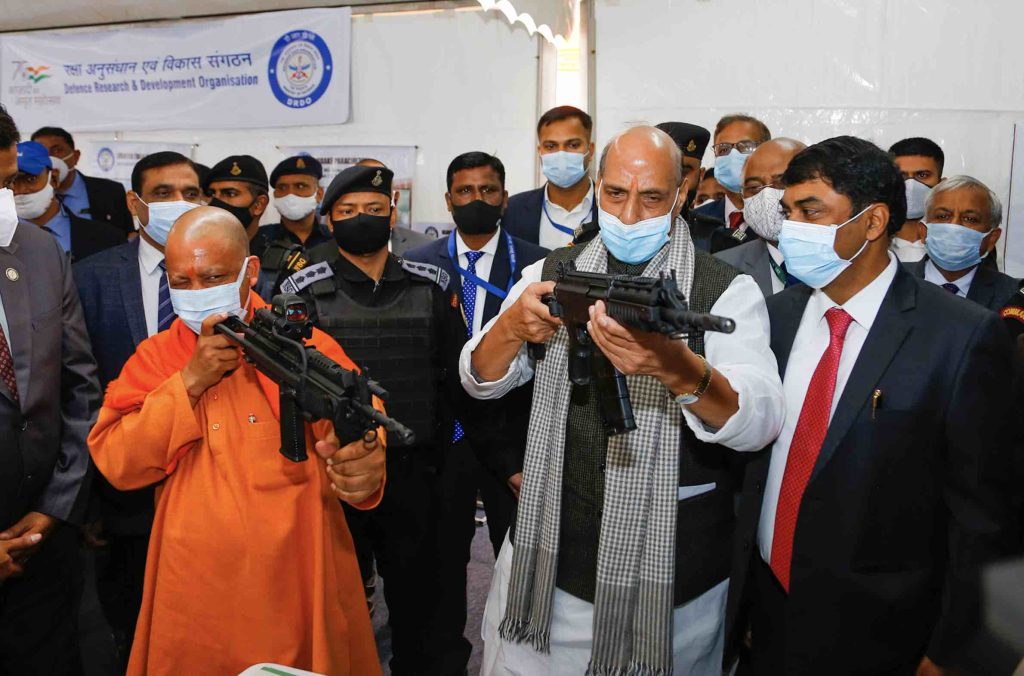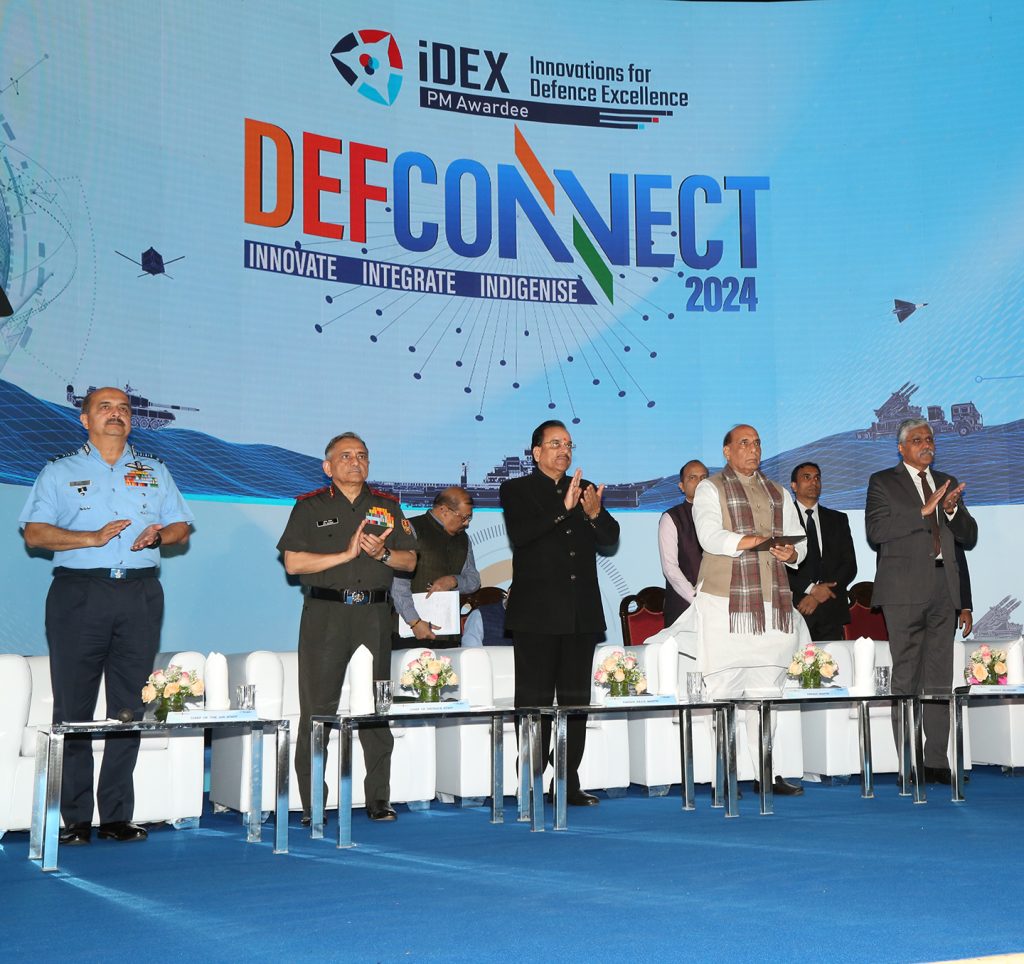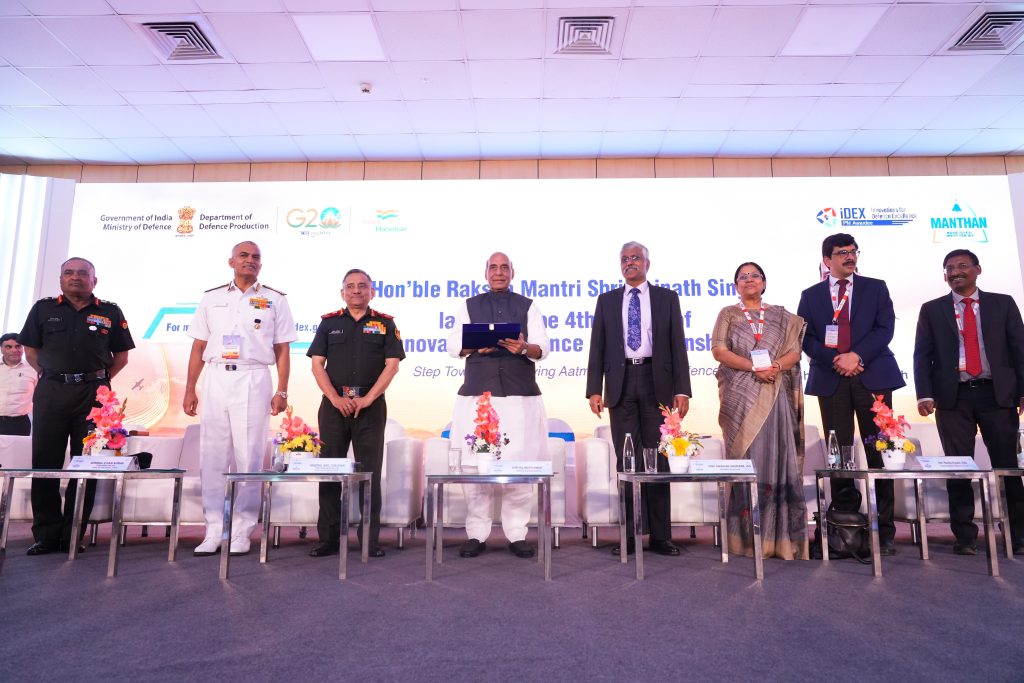With India boasting the world’s third-largest armed forces and a significant defence budget of approximately USD 34.53 billion, the landscape for defence startups in India is ripe with potential. Recognizing this opportunity, government initiatives like ‘Make in India’, technology transfers (TOT), and Original Equipment Manufacturer (OEM) engagements alongside favorable Foreign Direct Investment (FDI) policies are setting the stage for an estimated USD 10 billion business scope within the Indian defence industry.
The emergence of defence startups in India reflects an alignment with national aspirations and a promising trajectory for innovation and economic growth. As this article unfolds, we will offer a systematic approach to understanding India’s defence ecosystem, navigate the legal and regulatory frameworks, identify funding and investment opportunities, and devise strategies for market entry, with the ultimate aim of guiding entrepreneurs on how to start a defence startup in India.

Understanding the Defence Ecosystem in India
India’s defence sector is burgeoning, with the government earmarking substantial investments to modernize military capabilities. By 2030, the annual investment is projected to be INR 1.5 Lakh Cr ($18.3 Bn), signifying a steadfast commitment to enhancing the nation’s defence infrastructure.
- Defence Sector Growth and Government Initiatives:
- The ‘Make in India’ initiative propels indigenous production, offering tax incentives and favorable policies to not just established firms but also startups and SMEs.
- Defence exports have surged, recording an eightfold increase over five years, reaching INR 13,000 Cr ($1.6 Bn) in 2021-22.
- The iDEX programme, pivotal in promoting innovation, has garnered over 2000 proposals, with significant funding support extended to approximately 300 startups and MSMEs.
- Market Dynamics and Opportunities:
- India, the third highest military spender globally, allocated $76.6 Bn to military spending in 2022, accounting for 3.7% of the global military expenditure.
- With the government’s indigenisation lists, 310 items are mandated to be sourced domestically, encouraging the private sector defence manufacturing, which anticipates a $128 Bn opportunity over seven years.
- The changing terror landscape and the pressing need for advanced gear have catalyzed the growth of Indian ventures adept at integrating cost-effective, high-quality hardware and software.
- Challenges and Success Stories:
- Despite the promising outlook, startups face hurdles such as stringent regulations, high capital requirements, and resource scarcity.
- Noteworthy success stories include ideaForge, Tonbo Imaging, and Alpha Design Technologies, which have navigated these challenges and emerged as leaders in the defence startup ecosystem.
- The government’s push towards increasing defence exports and easing export regulations is fostering public-private partnerships and positioning India as a formidable defence supplier globally.
In conclusion, the Indian defence startup ecosystem is at a pivotal juncture, with a robust framework of support and a clear trajectory towards innovation and self-reliance. Entrepreneurs and investors are encouraged to explore this dynamic sector, where the confluence of government initiatives and market potential paves the way for revolutionary growth and technological advancement.

Legal and Regulatory Framework
Navigating the Legal and Regulatory Framework is a critical step for defence startups in India to ensure compliance and successful operations. Understanding the intricate legalities can be daunting; hence, a structured approach is recommended:
Key Legal and Regulatory Requirements
- Company Formation: Start by registering as a Private Limited Company or Limited Liability Partnership (LLP) with the Registrar of Companies (RoC). This is the foundational legal step for any defence startup in India.
- Taxation and Trademarks:
- Secure a Goods and Services Tax (GST) registration to ensure proper tax filing and credits.
- Protect your brand by registering a trademark, especially if you plan to collaborate with foreign brands.
- Quality and Manufacturing Compliance:
- Obtain an ISO certification to establish the quality of your products and services.
- If involved in manufacturing, ensure that you have the requisite factory or manufacturing licenses.
- Specialized Registrations and Licenses:
- MSME license and Startup India scheme license can provide access to government schemes and benefits.
- Industrial Licenses: A total of 606 Industrial Licenses have been issued to 369 companies in the defence sector till April 2023, showcasing the growth and opportunity in the field.
Statutory Acts and Defence Policies
- Industrial and Defence Acts:
- The Industries (Development and Regulation) Act, 1951, and the Arms Act 1959/Arms Rules 2016 regulate defence manufacturing.
- The Defence Procurement Procedure, 2016, and Defence Acquisition Procedure (DAP) 2020 outline the capital acquisition and procurement processes.
- Foreign Investment and Exchange:
- FDI policies, governed by the Foreign Exchange Management Act, 1999 (FEMA), allow up to 74% investment through the Automatic Route and 100% through the Government Route.
- The Department of Industrial Policy and Promotion (DIPP) oversees foreign direct investment policies in the industrial sector.
Compliance and Intellectual Property
- Operational Compliance:
- Adhere to labor laws, including payment of minimum wages and maintaining employee records.
- Develop workplace policies like POSH and Employee Handbooks to ensure a safe and regulated work environment.
- Intellectual Property and Data Protection:
- Secure IP rights through patents, trademarks, and copyrights registrations.
- With the Personal Data Protection Bill under review, implement data protection measures in compliance with international regulations like GDPR and CCPA.
In summary, defence startups must adhere to a comprehensive set of legal and regulatory requirements that govern everything from company formation to operational compliance and intellectual property. These frameworks are designed to foster a secure and robust defence ecosystem, encouraging innovation while ensuring national and international compliance.

Funding and Investment Opportunities
In the burgeoning landscape of defence startups in India, funding and investment opportunities are critical for fostering innovation and growth. Entrepreneurs looking to venture into this sector can avail themselves of a variety of financial support mechanisms and investment channels:
Government Initiatives and Funding Programs:
- iDEX (Innovations for Defence Excellence): A flagship program by the Ministry of Defence designed to bolster innovation in defence startups. It provides funding and support for startups to develop cutting-edge technologies.
- Technology Development Fund (TDF): Executed by DRDO, this fund aims to promote self-reliance in Defence Technology as part of the ‘Make in India’ initiative, supporting MSMEs and startups with a focus on indigenization.
- Defence India Startup Challenge (DISC): In partnership with Atal Innovation Mission, DISC encourages startups and innovators to develop prototypes and commercialize products for national defence and security.
Financial Allocations and Targets: - Budgetary Increases: The Capital Allocations for Defence Services modernisation and infrastructure have risen to INR 1,62,600 Cr in the 2023-24 Union Budget, indicating a government commitment to support the sector.
- Turnover Goals: There’s an ambitious target set to achieve a turnover of INR 1.75 Lakh Cr in aerospace and defence manufacturing by 2025, with export goals of INR 35,000 Cr, creating ample opportunities for startups.
Investment Opportunities and Strategies: - Venture Capital and Private Funding: Defence-specific VCs and private investors are crucial in the early funding rounds. For instance, ideaForge and Tonbo Imaging have successfully raised significant funds from major investors.
- Joint Ventures and Foreign Direct Investment (FDI): With increased FDI limits, startups can explore joint ventures with foreign companies to leverage international expertise and capital.
- Indigenisation Lists and Clusters: The Positive Indigenisation Lists and Defence Industrial Corridors offer clusters for defence manufacturing, encouraging startups to contribute to the indigenization efforts.
To navigate the complex funding environment, startups are advised to actively engage with the various government initiatives and consider strategic partnerships with investors who are well-versed in the defence sector’s unique challenges and opportunities.

Innovation and Technology Development
In the realm of innovation and technology development, defence startups in India are making significant strides. The Innovations for Defence Excellence (iDEX) scheme, a cornerstone of this progress, has catalyzed the creation of groundbreaking products and technologies. These innovations are not only enhancing India’s defence capabilities but also fostering a culture of technological advancement within the sector.
- Innovative Products Developed Through iDEX:
- A lightweight bulletproof jacket, enhancing the mobility and protection of armed forces personnel.
- Advanced drones designed for critical surveillance missions, contributing to heightened security measures.
- Portable oxygen concentrators, vital for high-altitude warfare, where oxygen scarcity poses a challenge.
The Make in India initiative has set ambitious targets to upscale domestic defence production, aiming to reach 75% by 2024. This initiative has galvanized companies like Sagar Defence Engineering and Optimised Electrotech to innovate across various product categories, from drones and unmanned surface vehicles (USVs) to AI-enabled electro-optic systems. NewSpace Research & Technology (NRT) is at the forefront, developing industrial UAVs, collective robotics, and AI modules, which are pivotal in modern warfare.
- Notable Contributions by Defence Startups:
- Sagar Defence Engineering: Diversified products for military and commercial use, including drones, aircraft, and USVs.
- Optimised Electrotech: Electro-optic systems with applications in defence and civilian sectors, such as border surveillance and smart city monitoring.
- NewSpace Research & Technology (NRT): Pioneering solutions in aerospace with their UAVs and AI technologies.
The Defence India Startup Challenge (DISC) compliments the iDEX programme by providing a platform for startups to solve specific defence problems, creating solutions tailored for the Indian Army, Navy, and Air Force. DISC has introduced various challenge categories, ranging from situational awareness and non-lethal devices to advanced 5G networks and drone swarms, stimulating innovation in response to modern defence needs.
- Emerging Opportunities in Cybersecurity and Dual-Use Technologies:
- With the Indian cybersecurity industry projected to grow to USD 35 billion by 2025, there is an increasing need for cybersecurity professionals, estimated at one million by 2020. This opens up a vast market for defence startups specializing in digital security.
- Dual-use products are gaining traction, offering applications in both civilian and military domains, thus attracting investors and expanding market potential.
- The integration of software-based solutions in defence is on the rise, presenting opportunities for startups to become early players in the digitalisation of defence.
These initiatives and the evolving landscape underscore the potential for defence startups in India to become key players in the global defence market. With the right support and innovation, these startups can contribute significantly to national security and the establishment of India as a self-reliant defence manufacturing hub.

Market Entry Strategies
Forging a path into the defence sector in India necessitates a strategic approach to market entry. Here are key strategies for defence startups to consider:
Formulate a Robust Business Plan
- Comprehensive Strategy: Outline a business plan that encompasses market analysis, product development, and financial projections. This plan should be the roadmap for all business activities.
- B2B Focus: Given that the end users are not the general public but government and defence entities, tailor your business plan to meet the specific needs of a B2B market.
- Government Engagement: Actively seek involvement in government programs like ‘Make in India’ for defence, which can provide startups with a platform for collaboration and growth.
- Export Promotion: Position your startup to be part of India’s push to become an export hub for defence products, aligning with national objectives.
Networking and Strategic Partnerships
- Defence Networks: Build connections with defence armory professionals, leveraging their expertise and insights to navigate the defence ecosystem.
- Collaborations:
- Partner with Indian SMEs to meet offset obligations and enter the defence manufacturing space.
- Engage with global entities for joint R&D, particularly in niche areas such as cyber security and space technologies.
Navigating the Defence Sector Landscape
- Government Ties: Forge relationships with key government bodies including the Ministry of Defence, Department of Defence Production, and Department of Industrial Policy and Promotion.
- Policy and Procurement: Focus efforts on central government in New Delhi for policy discussions and procurement opportunities.
- Defence Clusters: Identify and integrate with defence industry clusters in cities like Bengaluru and Hyderabad for potential co-production and collaboration.
These strategies are designed to provide defence startups with a clear pathway to enter and succeed in the complex yet rewarding defence sector in India. By focusing on these areas, startups can align with national goals, leverage existing opportunities, and contribute to the country’s burgeoning defence ecosystem.
Conclusion
Throughout this article, we’ve journeyed through the diverse landscape of India’s defence sector, offering keen entrepreneurs a constellation of insights—from policy frameworks to innovation pathways. The takeaways are clear: India’s defence ecosystem brims with potential, and the nexus of governmental support, market opportunities, and entrepreneurial spirit forms the backbone of a thriving industry. The significant milestones achieved by pioneering defence startups, alongside the encouraging trends in investment and technological innovation, signal a promising horizon for those ready to contribute to this enterprising field.
As we conclude, it is evident that the environment for building defence startups in India is not just favorable but poised for unprecedented growth. To those with the vision and vigor to embark on this venture, the path has been demarcated with ample opportunities for progress and collaboration. For those who aspire to navigate this challenging yet rewarding arena, let this guide serve as your strategic ally. As your next step, consider making your mark in this crucial industry and join the vanguard of defence entrepreneurs reshaping India’s future.
FAQs
Q: What are the steps to launching a defence startup in India?
A: To launch a defence startup in India, you should begin by registering as a Private Limited Company. Make sure to register for GST from the start, secure a Trademark to facilitate potential partnerships with foreign brands, obtain an ISO certificate, and acquire factory or manufacturing licenses if your startup will be involved in manufacturing.
Q: What is the startup revolution occurring in India?
A: The startup revolution in India refers to the rapid growth of the country’s entrepreneurial ecosystem, which is now the third-largest in the world. This growth has been significantly supported by government initiatives like Startup India. In 2022, Indian startups attracted an impressive $42 billion in funding, which marked a significant increase from the previous year.
Q: Which are the leading defence startups in India?
A: Some of the prominent defence startups in India include Adani Defence & Aerospace, Tata Advanced Systems, Optimized Electrotech, Axio, and Alpha Design Technologies. Overall, there are 73 military tech startups in the country.
Q: What is the purpose of the iDEX Open Challenge?
A: The iDEX Open Challenge is a program under the Innovations for Defence Excellence (iDEX) – Defence Innovation Organization (DIO) that seeks to foster innovation and entrepreneurship within the defence sector. It encourages individuals and companies to come up with innovative solutions to challenges faced by the defence establishment.













